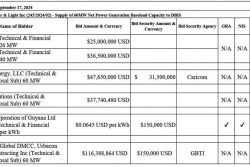Alissa Trotz is editor of the In the Diaspora Column. David Hinds teaches at Arizona State University
By Alissa Trotz and David Hinds
It is now exactly three weeks since Kelvin Fraser, an unarmed 16 year old fourth form student at Patentia Secondary School, was fatally shot by a policeman. A comprehensive response to the shooting and the events surrounding it must address the sexual harassment of schoolgirls that seems to have been a persistent problem in this area and the disengagement from education that is producing high levels of absenteeism from school. But what does it say about the state and about us as a people that in Guyana today, a headmistress’ call to the police (and she was understandably frustrated with an ongoing situation) results in the death – by a policeman wielding a shotgun, one must add – of a teenage schoolboy?
No charges have yet been laid, and one wonders what official answers will be produced this time in an attempt to make the matter go away. Yet again.
The first thing this tragedy confirms is that we have a police force that is out of control. There is a pattern of behaviour. Shooting as a first resort has become entrenched police culture. Even if this individual police officer is charged, this is not justice. It enables the killing of young Kelvin Fraser to be written off – again – as an individual aberration. In the same way that the torture of 15 year old Twyon Thomas late last year following the murder of Ramenauth Bisram could be written off. Or the killing of Yohance Douglas in 2003, shot in his back by the forces of law and order. Or the numerous killings of men, many of them young, which many in the society just accept because they are told these men are “criminals”.
The second thing the government’s response to the shooting of Kelvin Fraser confirms is its shameless readiness to intimidate families and communities engaging in righteous protest. This time the intimidation has taken three forms: giving money to Fraser’s family in return for their disassociation from any protest activity; threats to members of the community who participated in the protests; and harassment of the owners of the canter truck and minibus which transported the protestors to Georgetown. The objective is to cover up the crime and to silence the community. One of the vehicles that transported the protesters to Georgetown was impounded and the driver charged with several petty offences. Another vehicle has been prohibited from plying its normal route. This is nothing short of an assault on the right of citizens to make an honest living. The operators of these vehicles were simply transporting people as part of their normal commercial activity. Those who protested were expressing solidarity with Fraser’s family and asserting their constitutional and human right. They were standing up for the safety of their children, brothers, sons and community. Those who muzzled them are standing on the side of violence, bullying and lawlessness.
In his Kaieteur News column, Freddie Kissoon has rightly come out very strongly on the need for a united and strong response to this most recent act of police brutality. It is time for all of us to speak out forcefully and continuously against this abuse of power and against intimidation.
June 13, 2010 marked the 30th anniversary of the assassination of Walter Rodney. For all of us involved in commemorative activities in Guyana and the diaspora, it is important to remember that his is a living legacy. That means that we name the abuses and intimidation and violence that existed in the pre-1992 period and which formed the context for Rodney’s analysis and activism, but precisely because we do not turn a blind eye to the past, we must never bury our heads in the sand and ignore or whitewash or deny what is happening today. Rodney’s legacy demands of us that we continually examine our present political, economic and social situation, and challenge authoritarianism, corruption, big man politics, violence, and the stoking of racial tensions and fears that keep Guyanese divided and distract attention from continually growing inequalities within the country. We must call out those defenders of the current status quo in Guyana who would distort this legacy, who try to hold us hostage to the past in order to deflect attention away from the injustices that continue today. It is a mode of deformed and cynical politics that resurrects the memory of Walter Rodney in order to continue the same kind of politics which he ultimately died opposing. Ask yourself, who benefits from this manipulation? And how does this prevent us from getting the answers we deserve?
Tragically this is not the first time in recent memory that a public response to police brutality has been virtually non-existent. We only have to go back to November 2009, when the picket organized mainly by Red Thread outside the Georgetown Hospital following the torture of Twyon Thomas brought fewer than 100 people onto the streets, and has not provoked sustained collective outrage among Guyanese at home and in the diaspora.
What is clearly missing today is the speed and passionate outrage with which Guyanese used to respond to the trampling of people’s rights. It was in the early 1970s, and in response to a then emerging pattern of police brutality in Tiger Bay, that the Movement Against Oppression (MAO), which was known for its community involvement, was formed. One such instance was the police shooting, in 1972, of a fifteen year old unprivileged youth, Keith Caesar. MAO was not a big group, but an alliance that included town people, university lecturers, students, residents of Tiger Bay and political activists of all stripes, including members of the People’s Progressive Party who are now silent or defensive in the face of worse acts of police violence. The outrage then was swift, and it was wide-ranging in terms of the cross-section of the Guyanese community that came together.
One of the things we can take from Walter Rodney’s example is that racial unity and effective resistance depend on each other in Guyana. But we are a far way from the late 1970s when Rodney expressed hope that the racial unity that had been rebuilding among the Indo- and Afro-Guyanese working peoples was strong. In Guyana today, who will deny the levels of racial polarization among Indian and African Guyanese, a division that has its basis in the political contest for state power? Given this situation, we must frankly confront the hard reality that the inter-twining of race and politics presents real challenges to organizing with and working in communities. Every act of resistance becomes or can swiftly be turned into a race/party conflict. Four Red Thread women attended Kelvin Fraser’s funeral. One reported that at the church service an African-Guyanese PNC man spoke and stated that the government must go by any means necessary. This remark was greeted with applause from most of the African-Guyanese and a few Indian-Guyanese, while the Indian-Guyanese woman near to her whispered, “yuh hear wha’ he seh? By any means necessary?” This is sadly a scenario that is all too familiar, and it shows how deeply this country has been held hostage to and manipulated by the divide and rule practices of the two main political parties.
What this example shows us is the hard work that needs to be done if we are to effectively oppose the official attempts to bully a community into silence, to stop it from expressing outrage against the killing of a child of its own, and to prevent it from making connections with similar kinds of brutality and with other communities and individuals equally outraged at what is happening. Any organising must begin by recognizing how easily and how swiftly ethnic fears and insecurities can be and are mobilized in ways that divide communities against each other and even divide communities internally. We must frankly name and deal with this, if we are ever to move beyond party and race in defense of our collective security as a nation. The example of MAO shows us that action does not have to begin with hundreds or thousands of people on the street; this is an important lesson today given the fact that street protests in the post-1992 period have resulted in violence against Indo-Guyanese, showing again how race and party divide people from each other. MAO started over thirty years ago with a relatively small group of people from all walks of life and across a number of organizations and occupations. They found it necessary to take a stand against the police brutality they were starting to see on the streets. We can take a lesson from this history today in order to begin the work, not in small niches but together, as a collective voice that speaks up against police brutality and that does so in a principled way that consistently and adamantly refuses to allow us to remain hostage to and divided by race and party.




